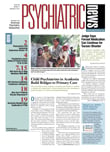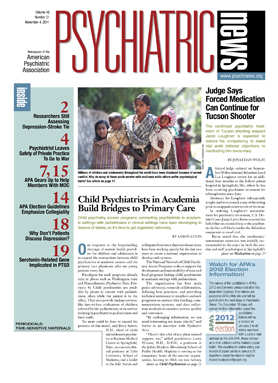APA is largely supportive of a proposal by the Department of Health and Human Services (HHS) to make sweeping changes to the regulations for research involving human subjects.
HHS's proposals are designed, broadly, to streamline and standardize informed consent and reporting requirements for research involving humans and to tailor administrative requirements for reporting to the level of risk involved in different studies. They appeared as an "advance notice of proposed rule making" in the Federal Register on July 25 under the title "Human Subjects Research Protections: Enhancing Protections for Research Subjects and Reducing Burden, Delay, and Ambiguity for Investigators" (Psychiatric News, September 2).
The advance notice permits HHS to get public and professional feedback before formally putting forward its proposed rule.
In response, APA Medical Director James H. Scully Jr., M.D., in a letter to HHS in September, told Jerry Menikoff, M.D., J.D., director of the HHS Office for Human Research Protections, that "[l]argely, APA leaders and experts on research ethics welcome these proposed rule changes."
He added, "We view these proposed changes as bringing administrative and reporting requirements into line with transformations that have occurred across the research landscape. Specifically, APA supports the modification of informed consent forms and procedures, the use of a central independent review board (IRB) for multisite research, the harmonization of regulations affecting human subjects research, and linking administrative requirements to the level of human risk posed to humans undergoing research."
The rules for human research subjects were first formulated in the 1970s and 1980s and implemented in the early 1990s. These regulations, which govern risk assessment and informed consent in human research, became accepted by multiple federal agencies that oversee research and were codified as the "Common Rule."
Since then, much on the research landscape has changed markedly. For instance, in the time since the Common Rule was established, multisite trials have become more common. But under the Common Rule, every institution participating in the trial must establish a separate IRB to approve the research—a cumbersome requirement that has greatly increased the cost and administrative burden associated with multisite trials.
Under the regulations proposed by HHS, a multisite trial would require only one IRB of record. In his letter, Scully strongly endorsed the change. "APA's DSM-5 field trials have 11 different participating sites," he noted. "APA has found multisite trials to be difficult, in part, because there are multiple IRBs that almost invariably do not use the same informed consent forms. APA could reduce the costs it incurs when doing multisite trials if this proposed rule were to be implemented, thereby allowing for one central IRB in a multisite research trial."
One proposal APA does not favor would place new restrictions on use of biospecimens. "These rules are likely to impede numerous forms of research including the use of bio-banked specimens and even chart reviews," Scully wrote. "Many biospecimens come from ordinary clinical procedures, after which their origins are made anonymous. No harm can come to the donors of these samples when they are subsequently used in research, and the requirement of consent for research uses will impose additional costs and decrease the availability of samples."
Finally, Scully in his letter drew attention to the fact that the proposed regulations do not address the subject of "vulnerable populations."
He wrote, "As of present, there have never been data to support the conclusion that some groups of persons are more vulnerable to coercion than are other research subjects (e.g., pregnant women). This portion of the regulations needs to be revamped to shed light on the groups for which such data exist."
The letter is posted at <www.psych.org/MainMenu/AdvocacyGovernmentRelations/GovernmentRelations/RegulatoryComments/Human-Subjects-Research-Comments.aspx?FT=.pdf>. More information is available from Julie Clements, J.D., M.P.P., deputy director of regulatory affairs in APA's Department of Government Relations, at (703) 907-7842.

